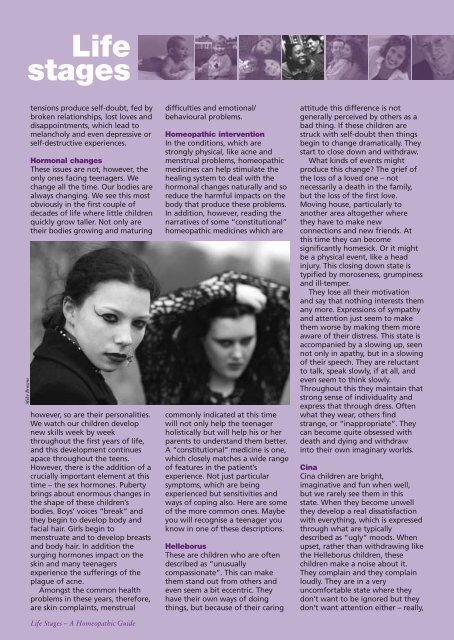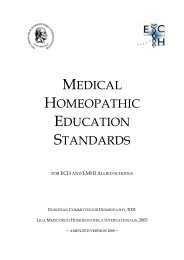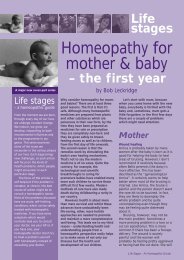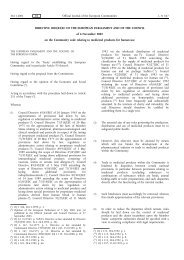LifestagesMike Brownetensions produce self-doubt, fed bybroken relationships, lost loves anddisappointments, which lead tomelancholy and even depressive orself-destructive experiences.Hormonal changesThese issues are not, however, theonly ones facing <strong>teenagers</strong>. Wechange all the time. Our bodies arealways changing. We see this mostobviously in the first couple ofdecades of life where little childrenquickly grow taller. Not only aretheir bodies growing and maturinghowever, so are their personalities.We watch our children developnew skills week by weekthroughout the first years of life,and this development continuesapace throughout the teens.However, there is the addition of acrucially important element at thistime – the sex hormones. Pubertybrings about enormous changes inthe shape of these children’sbodies. Boys’ voices “break” andthey begin to develop body andfacial hair. Girls begin tomenstruate and to develop breastsand body hair. In addition thesurging hormones impact on theskin and many <strong>teenagers</strong>experience the sufferings of theplague of acne.Amongst the common healthproblems in these years, there<strong>for</strong>e,are skin complaints, menstrualLife Stages – A Homeopathic Guidedifficulties and emotional/behavioural problems.Homeopathic interventionIn the conditions, which arestrongly physical, like acne andmenstrual problems, homeopathicmedicines can help stimulate thehealing system to deal with thehormonal changes naturally and soreduce the harmful impacts on thebody that produce these problems.In addition, however, reading thenarratives of some “constitutional”homeopathic medicines which arecommonly indicated at this timewill not only help the teenagerholistically but will help his or herparents to understand them better.A “constitutional” medicine is one,which closely matches a wide rangeof features in the patient’sexperience. Not just particularsymptoms, which are beingexperienced but sensitivities andways of coping also. Here are someof the more common ones. Maybeyou will recognise a teenager youknow in one of these descriptions.HelleborusThese are children who are oftendescribed as “unusuallycompassionate”. This can makethem stand out from others andeven seem a bit eccentric. Theyhave their own ways of doingthings, but because of their caringattitude this difference is notgenerally perceived by others as abad thing. If these children arestruck with self-doubt then thingsbegin to change dramatically. Theystart to close down and withdraw.What kinds of events mightproduce this change? The grief ofthe loss of a loved one – notnecessarily a death in the family,but the loss of the first love.Moving house, particularly toanother area altogether wherethey have to make newconnections and new friends. Atthis time they can becomesignificantly homesick. Or it mightbe a physical event, like a headinjury. This closing down state istypified by moroseness, grumpinessand ill-temper.They lose all their motivationand say that nothing interests themany more. Expressions of sympathyand attention just seem to makethem worse by making them moreaware of their distress. This state isaccompanied by a slowing up, seennot only in apathy, but in a slowingof their speech. They are reluctantto talk, speak slowly, if at all, andeven seem to think slowly.Throughout this they maintain thatstrong sense of individuality andexpress that through dress. Oftenwhat they wear, others findstrange, or “inappropriate”. Theycan become quite obsessed withdeath and dying and withdrawinto their own imaginary worlds.CinaCina children are bright,imaginative and fun when well,but we rarely see them in thisstate. When they become unwellthey develop a real dissatisfactionwith everything, which is expressedthrough what are typicallydescribed as “ugly” moods. Whenupset, rather than withdrawing likethe Helleborus children, thesechildren make a noise about it.They complain and they complainloudly. They are in a veryuncom<strong>for</strong>table state where theydon’t want to be ignored but theydon’t want attention either – really,
4: <strong>Homeopathy</strong> <strong>for</strong> <strong>teenagers</strong>there is no pleasing them!These are children who candevelop tics and spasms, or evenepileptic type “absences”. They,too, have active imaginations andcan become quite disturbed,especially at night, when they areactive dreamers and will talk oreven scream in their sleep.TuberculinumIn previous articles we have seenthat Tuberculinum can be acommon remedy in young childrenand even toddlers and here in theteenage years it is also common.The typical teenager who needsthis remedy is restless, stubbornand very rebellious. They can bequite malicious, or even destructivewhen they are angry. They arecontinuously kicking against anyidea of authority and yet are highlyidealistic, even romantic, in theirthinking.These are the kids who identifywith political revolutionaries, andwho, in times past, would put upposters of Che Guevara andChairman Mao on their bedroomwalls – not so common these days!They might identify with other“rebels”. The punk rock movementattracted a lot of these kids(although it also attracted manyother <strong>teenagers</strong> who needed quitedifferent homeopathic medicines!).Despite their anger and theirrestlessness, they still have manyfears and these might be quitespecific – dogs, thunderstorms,darkness, <strong>for</strong> example.Skin problemsAcne is common to both boys andgirls but is more common in theboys. This is because it isparticularly provoked by thecirculating testosterone levels,which make the skin more greasyand oily. The pores become blockedand infected and so we see the fullrange of spots, from black-heads,to red swellings, to pus-fillederuptions ,which cause <strong>teenagers</strong>such distress. In more severe cases,there can be many spots over theface, the <strong>for</strong>ehead, the chest andthe back, and the most severe onesare quite destructive of the skinleaving deep pits and scars. Whilsteven in its milder <strong>for</strong>ms acne cancause great distress, in its mostsevere <strong>for</strong>ms it leaves permanentscarring.The orthodox treatments <strong>for</strong> acnecentre around the use of antibiotics,used either in short courses to fightthe larger, more painful lesions, orin low doses over longer periods oftime to treat chronic acne. Thehomeopathic approach is to tryand stimulate the person’s ownhealing system to reduce thesensitivity in the skin to thecirculating hormones. One goodway to do this is to give them their“constitutional” medicine but thisis very difficult to work out if youare the parent. It is best to have afull consultation with a homeopathicdoctor if you want to takethis approach. However, there aresome common medicines, which maybe indicated on the basis of someof the features of the acne itself.For treatment of the biggerspots, which might even be smallabscesses, Hepar sulph can beindicated. This is where a lot of pushas gathered, the patient feelschilly and irritable, and there isconsiderable swelling andtenderness. They might find thatputting a hot cloth against the sorebit helps. At an earlier stage to this,where there is just redness, heatand swelling but no pus yet, thenBelladonna might be more useful,especially if the patient is agitated,restless and fevered.When we considered theproblems of children in an earlierarticle, we looked at Sulphur as acommon medicine <strong>for</strong> the restless,inquisitive, messy and disorganisedchild. Certainly, many <strong>teenagers</strong>’rooms look like “Sulphur rooms”!They are messy and chaotic and asthey develop many passing fancieswith a disposition to collect things,their rooms are really full of“stuff”! These tend to be hot,sweaty <strong>teenagers</strong> who love nothingbetter than fast food, like burgers,pizzas and chips. They often havequite bad skin with many red, itchyand hot patches and spots.Silica is a common remedy inacne. The Silica child tends to be abit chilly, sensitive, shy and veryconcerned to do well at school.Indeed, a fear of failing can causemany problems <strong>for</strong> these patientsaround examination times. Theirskin is unhealthy and injuries,scratches and inflammation easilybecome infected with theinfections grumbling on <strong>for</strong> longperiods of time. These skinproblems are not as dramatic as inthe Hepar sulph or the Sulphurstates but seem to be more chronic.These are also sweaty kids withparticularly offensive foot sweats.Kali bromatum is anothercommon acne medicine. This ismore commonly indicated in some ➤Life Stages – A Homeopathic Guide









